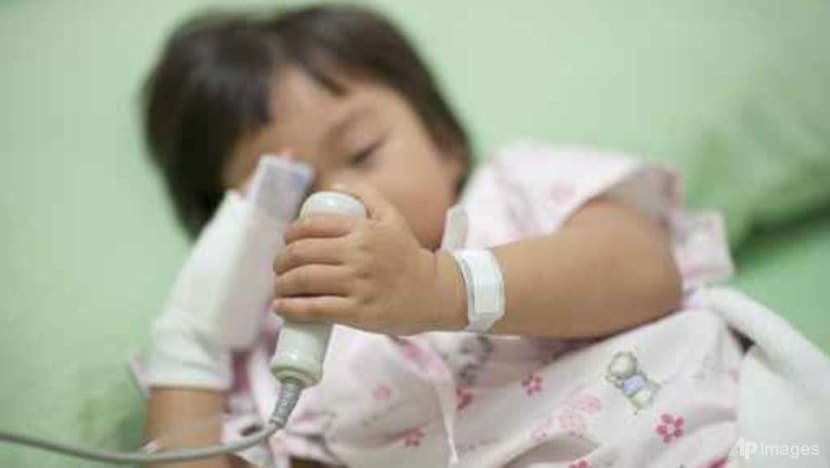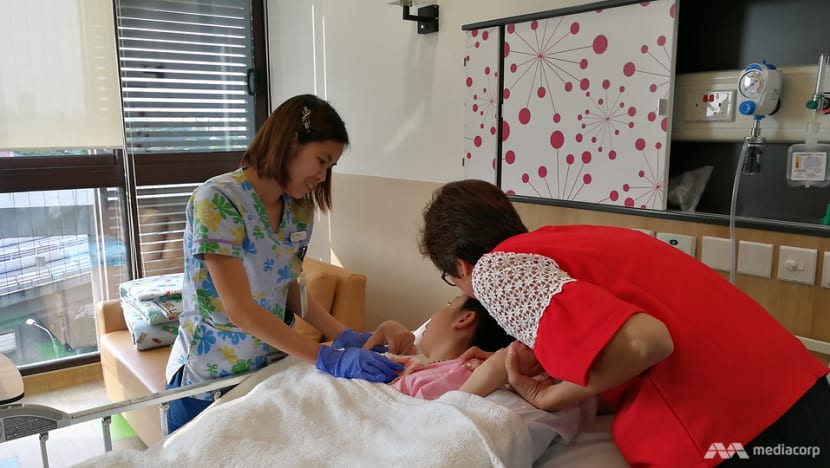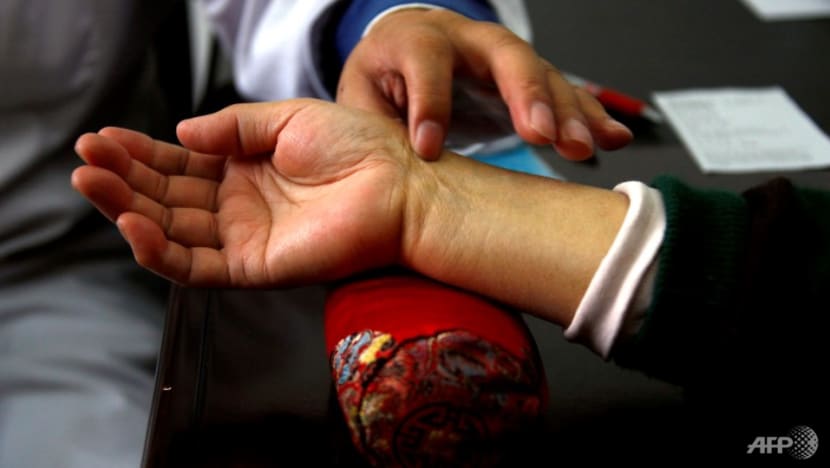commentary Commentary
Commentary: When children die, they take away the future
How do we deal with losing our young who contract a terminal illness, for whom growing old is not an option?

A child with cancer presses the emergency call button. (Photo: AP)
SINGAPORE: In a scene from The Two Towers of the Lord of the Rings film trilogy, King Theoden awakes from an enchanted state to realise that his son Theodred has been killed. Responding to attempted words of comfort, he says: “No parent should have to bury their child”, before breaking down in grief.
The death of a young person seems to go against the natural order of things. It shouldn’t be. It couldn’t be. Which is why people respond with disbelief, shock, indignation and pain. And which is why in some traditional Chinese societies, a situation where 白发人送黑发人 (literally meaning “a white-haired person sending off a black-haired person”) was considered so inauspicious that an older person might be prevented from attending a younger relative’s funeral.
It is uncommon for younger people to die. According to statistics, in 2015, less than 10 per cent of deaths in Singapore involved residents aged 50 years old and younger. A proportion of these deaths would have been sudden and unexpected, due to an accident, an outbreak of violence or a sudden collapse. In others, it would have followed a period of illness, so some of these deaths were not so “unexpected”.
But they are distressing and traumatic all the same.
WHAT MAKES IT SO HARD
In palliative care, the focus of care is not only on the patient, but also on the family and nowhere is this more evident than for the younger patient. Frequently there are three generations involved – for the younger patient, this would be parents and grandparents; for the older-but-still-young patient in the “sandwich generation”, there could be siblings, a partner, young children and elderly parents.
Everyone is affected in different ways and everyone has their own way of dealing with it.
The particular grief of a young person’s passing is poignantly expressed by the Reverend William Sloane Coffin, who in 1983 lost his son Alex in a car accident. He delivered a eulogy to his congregation where he said: “When parents die, as my mother did last month, they take with them a large portion of the past. But when children die, they take away the future as well.”
This is perhaps what makes the pain so profound. Contracting a serious illness such as cancer or a motor neuron disease begins a series of losses for the patient, not just of health, but on a deeper level, of one’s sense of self, hopes and dreams for the future.
What do you do when you know you will never see your children grow up, that you will never grow old, nor “ride off into the sunset” with your life partner?
WHAT MAKES IT MORE BEARABLE?
In palliative care, one must have information about the future in order to plan, prioritise and prepare. Not everyone will want a detailed account of what to expect, but patients and families should have enough information and be able to consider a range of options, whether it is to pursue aggressive and even experimental treatments in order to prolong life as much as possible, or to focus on symptom management only (with quality of life above all else), or somewhere in between.

People do the best they can to cope. Support can come from many sources, from one’s family, friends, faith community as well as healthcare professionals.
For younger patients, peer support can be particularly important, whether it is friends from school or a sports club or even fellow patients and they may choose to connect face-to-face, or on social media. Associations like CanTeen who support youths in Australia and New Zealand, exist to provide information and support to young people who have cancer or have a loved one living with cancer, whether a parent, sibling or friend.
Every person wants to live as normal a life as possible, even with serious illness, and for younger patients, this means being able to hang out with friends, go to school, and yes, even serving National Service. I have had patients who wanted to take their final examinations despite being very ill and it was touching to see how hard their schools and teachers tried to make that happen for them.
WHAT WE CAN DO BETTER?
The problem is that palliative care tends to be considered very late. This is despite evidence that palliative care can improve one’s quality of life, and may even be life-prolonging for some patients. “It’s not time yet” is an oft-heard remark. The reality is, it may never be the “right” time but it may be the only time for those important discussions.
A recent news report from Australia highlighted that there were still many patients who were not getting palliative care support. New South Wales’ Health Minister Brad Hazzard commented: "We have a whole range of specialists who are trying to keep people alive – and trying to give them a good death comes perhaps as an afterthought."
These are harsh words, perhaps with a ring of truth, but are more a reflection of the healthcare system.
"Sometimes, doctors don't have the language to get patients ready for dying. It's not because the doctor can't be bothered or because the doctor doesn't care."
Healthcare systems everywhere are still geared towards hospitals, treatment and fixing problems, without offering many substantive alternatives to the great “unfixables” like ageing and dying.
Given the chance, many people would want to do more with the time left. Some patients will want to make practical preparations; others may wish to leave mementos, gifts or letters; yet others will want to tick off items on their bucket list. What they do would be unique and meaningful to that person and family.

Young people can and have made lasting impressions and left legacies for their families and others. Singaporean Jordan Lim was 18 years old when he died from bone cancer but not before deciding to donate his corneas. Kate Granger was a UK geriatrician and cancer patient, who campaigned for better patient care and raised funds for charity. She died last year aged 34.
WHAT THE LIVING CAN LEARN FROM THE DYING
A recent survey conducted by the Kaiser Family Foundation and the Economist across four countries showed remarkable similarities about what people valued towards the end of life. A few wanted their lives to be prolonged as much as possible, but the majority wanted their lives to be comfortable, at peace, with their loved ones around them and not burden their families with financial worries, or having to make decisions for them.
So, young or old, richer or poorer, it turns out the things that matter at the end of life, aren’t “things” at all.
To quote Paul Kalanithi from When Breath Becomes Air, who passed away from lung cancer in 2015:
Everyone succumbs to finitude. I suspect I am not the only one who reaches this pluperfect state. Most ambitions are either achieved or abandoned; either way, they belong to the past. The future, instead of the ladders toward the goals of life, flattens out to a perpetual present. Money, status, all the vanities the preacher of Ecclesiastes described hold so little interest: A chasing after wind indeed.
As a society, we need to consider how we view “living with dying” if we want to live well before leaving well. The first step is to recognise it could happen to you, or to someone you love. Then be willing to start a conversation about what matters most.
Seriously, it won’t kill you to talk about it.
Dr Noreen Chan heads the Division of Palliative Care at the National University Cancer Institute, Singapore. Dr Chan is also a panellist on Channel NewsAsia’s Perspectives episode on Patients in Pain, which was broadcast on Wednesday (May 17).
This is the second commentary in Channel NewsAsia's series exploring key issues and challenges facing patients with terminal illness and care at the end of life.
Read the first commentary on what well-being means for someone with terminal illness here.














